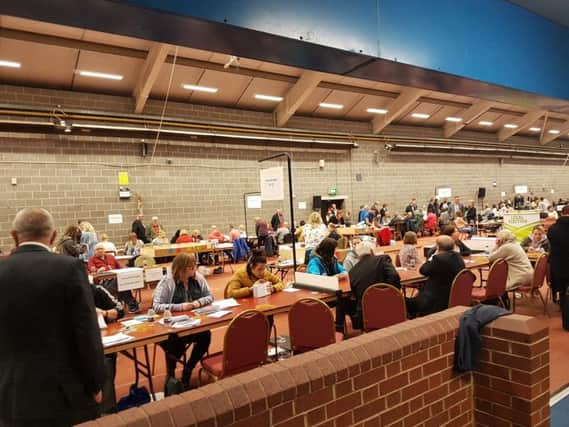Only a quarter of Wakefield residents voted in May local election


It was the district's lowest turnout at any council poll since 2003, which took place just after the breakout of the Iraq War.
It's a figure that suggests a growing disconnect between local politicians and the people they represent. Certainly, councillors and candidates reported finding plenty of apathy on the doorstep in the run-up to the May poll.
Advertisement
Hide AdAdvertisement
Hide AdBut what's behind the numbers and how can more people become involved in the democratic process?
Speaking on election night, Wakefield council leader Peter Box said the turnout was "very, very disappointing".
"I think people have got election fatigue to be honest," he said.
"We had a General Election last year, we had the (European Union) referendum the year before that and local elections (and a General Election) the year before that.
Advertisement
Hide AdAdvertisement
Hide Ad"I think perhaps there is a slight disenfranchisment with politicians generally, but it is disappointing because I believe people should exercise democratic right to vote."
"Disillusioned" was how 60 year-old Matt Standering, from Normanton, described himself when asked before the election why he wasn't voting.
"A lot of politicians just push the message that’s given to them from above and that’s it," he said.
Jon White, from the Wakefield Rural ward, said that local elections made "no difference" in an era where authorities are so short of cash.
Advertisement
Hide AdAdvertisement
Hide AdHe said: “Councils just aren’t getting any money from central government and until they do there’s no point in voting because whichever party gets in they can’t do anything without money."
Coun Box has said he is in favour of implementing compulsory voting, which is enforced in Australia.
The system makes a trip to the ballot box mandatory for the country's citizens, who could face a trip to court and a fine if they don't.
It's a policy, enforced in just nine other nations, which has been criticised for being anti-democratic in itself for not making voting a free choice.
Advertisement
Hide AdAdvertisement
Hide AdBut a 2015 YouGov poll suggested Coun Box was far from alone in his view. In fact, more than half the British public agreed with him. The same month, an influential think tank recommended that all young people eligible to vote for the first time should be made to have their say.
But according to pressure group The Electoral Reform Society (ERS), the problem runs far deeper. They say a lack of options on the ballot paper and the dominance of the main parties repels voters.
Chief executive Darren Hughes said: “There are many reasons why turnout is low - but not least is the fact that many feel their voices are not heard, because of a broken voting system that means seats do not match votes.
"Too often elections are one or two-party races, with little choice and with voters feeling they must hold their nose at the ballot box."
Advertisement
Hide AdAdvertisement
Hide AdThis could well be a factor in Wakefield, where such was the power of the ruling Labour group before election night, there was no way they could lose their majority even if they lost in all 21 seats they contested on May 3.
The ERS have suggested a number of changes, including having adults automatically on the electoral roll.
Mr Hughes said: "We need to look at new ways of doing local democracy, to ensure everyone has a stake in politics.
"That could include allowing people to vote at weekends and at any polling station, extending the franchise to 16 and 17 year-olds and moving to an automatic system of registering to vote so no-one is left out."
Advertisement
Hide AdAdvertisement
Hide AdTurnouts for local and European elections have traditionally been limp, especially in years without a General Election.
In a 2011 referendum, the public decisively rejected an alternative voting system in favour of retaining first past-the-post.
But with engagement in local politics seemingly as weak as ever, participation could remain critically low until some sort of change is implemented.
In numbers
Turnout in 2018 Wakefield District local elections - 26.86%
Lowest turnout for - 15 years
Turnout in 2003 Wakefield District local elections - 25.55%
Proportion of British people in favour of mandatory voting (2015 YouGov poll) - 55%
UK turnout at 2017 General Election - 68.7% (highest at a General Election in the 21st century)
Proportion of people in favour of AV voting system (2011 referendum) - 32%